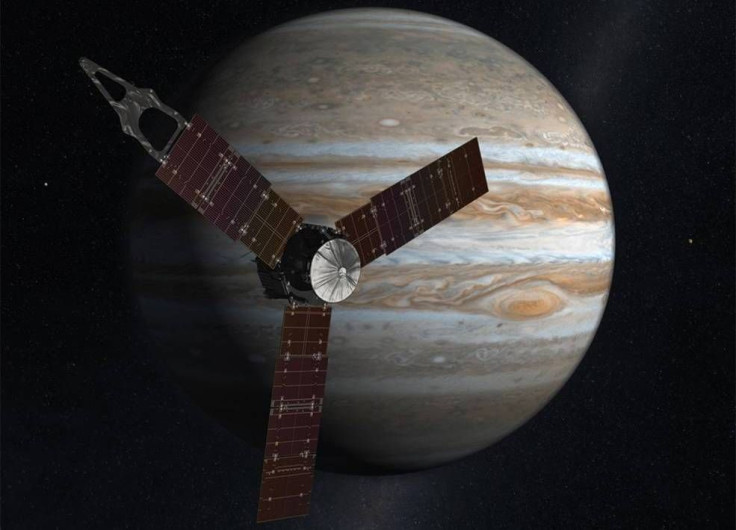NASA Juno Mission: Scientists Change Spacecraft's Orbit Plans After Engine Issues Arise

NASA researchers are modifying the orbit plans of its Juno spacecraft, which is orbiting Jupiter, after coming across engine problems. An operation scheduled for Oct. 19 has been pushed back to Dec. 11 so that scientists can better understand what is happening.
The Juno spacecraft, part of a mission in NASA's New Frontiers Program, launched on Aug. 5, 2011 from Cape Canaveral, Florida and entered Jupiter’s orbit on July 4 of this year. Earlier this summer, the spacecraft made its first full orbit around the gas giant–the first of 36 planned flybys during the 20-month mission–flying 2,500 miles above the planet’s dense clouds.
On its current path, which The Verge calls a “highly elliptical orbit,” the spacecraft takes 53.4 days to orbit the planet. The initial plan was for the Juno to turn on its main engine, by burning its main rocket motor, after completing two long orbits to reduce its orbital period from 53.4 to 14 days. The burn, says the space agency, is called the period reduction maneuver (PRM).
But after a pair of helium check valves part of the Juno’s pressurization system did not act up to par in a command sequence, the team is holding off on the firing the spacecraft’s Leros 1b engine for one more orbit.
"Telemetry indicates that two helium check valves that play an important role in the firing of the spacecraft's main engine did not operate as expected during a command sequence that was initiated yesterday," said Rick Nybakken, Juno’s project manager, in a statement. "The valves should have opened in a few seconds, but it took several minutes. We need to better understand this issue before moving forward with a burn of the main engine."
There is a silver lining to this change, as this gives scientists more data to work with. The original Oct. 19 flyby was supposed to have limited instruments on board the spacecraft. With the PRM maneuver postponed, all scientific instruments on the spacecraft will continue gathering data.
"It is important to note that the orbital period does not affect the quality of the science that takes place during one of Juno's close flybys of Jupiter," said Scott Bolton, principal investigator of Juno, in a statement. "The mission is very flexible that way. The data we collected during our first flyby on August 27th was a revelation, and I fully anticipate a similar result from Juno's October 19th flyby."
© Copyright IBTimes 2025. All rights reserved.






















